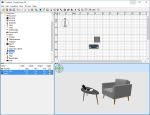- Home
- computer software
- Computer Processor Types
Computer processor types
How do we categorize computer processor types? We know that computer processor also called CPU (Central Processing Unit) is one of the major components in computer systems. Usually, it is referred as the brain of computer, because it is the place where all the computing process (calculation, comparison and logical decisions) is performed.
This dictates your computer performance is mainly depend on the type of processor installed in your computer. The more the computing power of a processor, the higher and faster is the processing capacity of that computer.
Taking this into mind, this article will describe the major grouping of computer processors manufactured up to now.
Currently, wide varieties of computer processor types are available on the market. Both Intel and AMD, the largest microprocessor manufacturers in the world, have introduced several types of computer processors.
Each processor type is different from the other in performance and technology. Unless you know the features behind each type of processor, choosing the right type could be a challenging task when purchasing, upgrading or building your own computer.
Groups of computer processor types
Based on the overall performance and the type of work designed for, computer processors are grouped into three main categories. There could be other applicable methods to classify computer processors.
However, this grouping will help you to ease the complication when selecting a processor both for desktop and mobile computers. Computer processors are grouped into the following three divisions. This grouping doesn’t include processors for Server and Workstation PCs.
1. High-End Processors
Processors in this group are designed for intensive applications, since the programs require high processing power. What makes high-end is the advanced microprocessor technology incorporated with these types of processors.
Read more on features of best computer processor here.
Other than the normal usage of computer applications, if you are into Statistical analysis, intensive graphics, creating and editing professional videos, extreme 3D gaming, multitasking and multi-threading application then you should choose a computer installed with a processor categorized in high-end group.
Both Intel and AMD introduced processors categorized as high-end. The latest Intel Core I Series processors: i3, i5, i7, i9 and AMD Phenom family processors are among high-end CPU’s. The prices of high-end processors are a bit higher comparing with the rest CPU’s.
2. Mid-End computer processor types
Mi-range processors are meant for middle intensive tasks. Beyond the standard work you do with mid-range processors, you can do tasks such as basic 3D Gaming, casual photo editing, home video creating, and multimedia applications.
Some of the common mid-range Intel processors include Intel Core 2 Quad, Intel Core 2 Extreme, Intel Core 2 Duo, Intel Pentium Dual Core and Intel Core Duo/Solo. AMD Phenom 1 X3, AMD Turion family and AMD Athlon family processors are categorized into mid-range CPUs.
Read Intel processor comparison chart to know more about Intel processors
Read AMD processor comparison chart to know more about AMD processors
3. Basic or economy computer processor types
As the name implies, processors in this group are low performing CPUs with cheap price. If you are into non-intensive tasks such as simple gaming, office applications, internet browsing, email and common graphics, then your choice of processor grouped as budget CPUs.
AMD Sempron, AMD Athlon Neo and Intel Atom, Intel Centrino, Centrino Duo and Celeron are grouped into economy processors.
Which processor type is right for me?
Your choice of computer processor depends on the type of work you do and the financial capability. If you are not financially constraint, you can go for higher version of processor without considering your computing need. This will help you to work on your computer long enough without upgrading and maintenance.
On the other hand, if you are not financially capable, you may go to mid-range or economy processors that can serve your current need and update or upgrade the computer in the future when your financial situation permits.
Conclusion
In conclusion, If you want to have the right computer, you should understand computer processor types and the technology combined with each type before purchasing. Not only this will guide you to the right processor type, it also keeps you from unnecessary expense.


